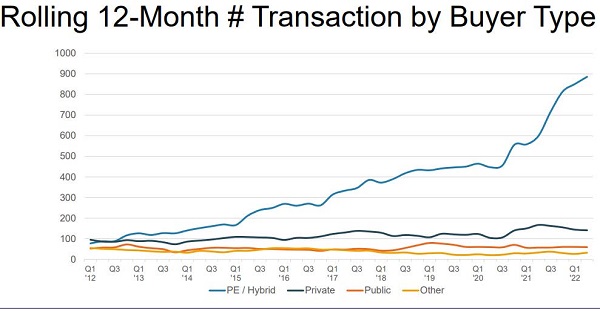Private equity firms are dominating the mergers & acquisition landscape, which is leading to a major realignment of the independent agency business model.
We are experiencing the greatest wealth transfer in the history of the independent agency system and traditional, privately held retail independent insurance agencies are getting crushed in the merger & acquisition game.
The independent agent system experienced a record 1,061 mergers and acquisitions transactions between independent agencies and brokers in 2021 with a record 427 M&A transactions reported in the first half of 2022, according to Optis Partners, an investment banking and financial consulting firm specializing in the insurance industry.
Much of the increase is driven by the highly anticipated retirements of the baby boomer generation with billions of dollars being transferred from one agency owner to another over the next five years, according to the report.
And while this sounds like great news for the independent agency system, there are concerns. Given the lack of viable internal perpetuation options, record-high independent agency valuations and a massive infusion of private equity (PE) dollars into the independent agency system, we could be facing a major realignment of the independent agency business model.
Currently, M&A is a natural part of every industry's evolution and certainly not new to the independent agency system. However, PE firms are dominating the M&A landscape, which is quickly leading to the diminishing of the agent entrepreneur business owner. PE buyers are now responsible for 90% of the M&A activity in the independent agency system.

The Game Has Changed
While traditional retail independent agencies are currently getting crushed by PE firms in the M&A game, it does not have to be that way.
Most of our client engagements at IA Valuations, operating under the Ohio Insurance Agents brand, start with agency owners who are ready to sell their agency and want to explore the marketplace to better understand their options and the process for what is likely the single largest financial transaction of their lifetime.
In most instances, we find the seller would prefer to sell to their local, friendly retail agency competitor. However, in most instances, they are completely ill-equipped to compete with the PE firms.
In our experience, most agency owners that have espoused a growth by acquisition strategy do not understand the game that is being played and are severely out of date with the tactics in today's M&A marketplace.
So, here are four ways the market has changed and how agencies can get back in the game:
1) M&A advisors are involved in every transaction. Unless an agency owner is perpetuating internally, no owner should sell their agency without engaging an advisor in the sale transaction. While M&A advisors are not a new phenomenon for large agency transactions, they are fairly new to small and mid-sized agencies. It is now an option for every transaction and all parties should expect to be represented and put through a process.
No one would sell their home or any other meaningful financial asset without testing the market. Competition always results in a better outcome for all parties.
2) PE firms are scouting for new agency acquisition opportunities. You should expect those PE firms to be talking to the longtime prospects that you have had your eye on for years.
3) Sellers are looking for lump-sum payouts. Sellers are not looking to finance external transactions over five to 10 years, but instead are looking for a significant lump sum upfront. PE firms are well equipped to do this at top dollar. Traditional retail agencies can overcome this by conducting thorough due diligence on the financials and book of business, as well as through working with an independent agent-centric lender.
4) It's a seller's market. Sellers are not selling externally at a discount so be prepared to be part of a bidding process and pay the going rate for an agency.
Traditional retail independent agencies can overcome the recent trend of PE acquisitions in this space. However, it is going to require agency owners to be better prepared to overcome some of the competitive advantages PE firms have in the current marketplace.
Jeff Smith is CEO of the Ohio Insurance Agents Association.
